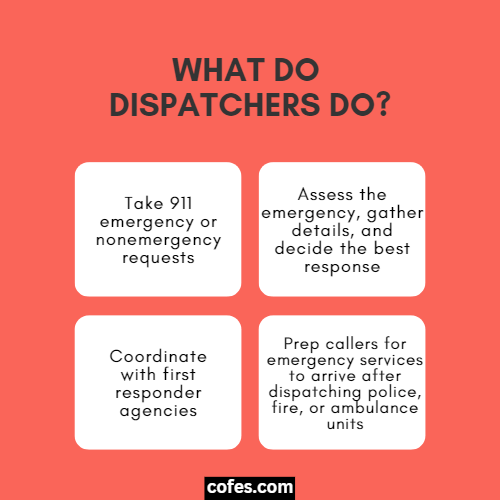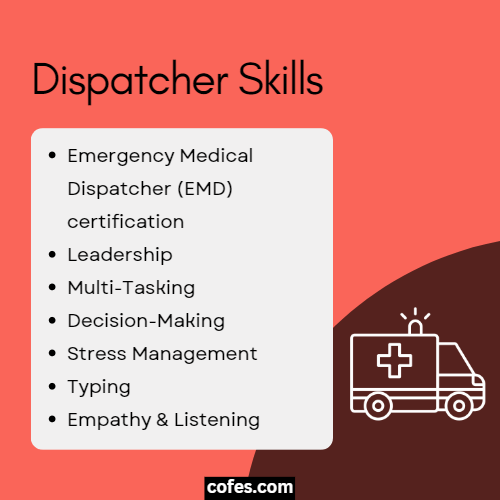Dispatchers serve as a communicator between drivers and customers since they are usually relaying messages from one to the other.
They may have to communicate pickup instructions to drivers, or in more common cases, they relay emergency calls to police officers if they are a 9-1-1 Dispatcher.
In this article, we’ll discuss what Dispatchers do, how much money they make, how to become one, and more.
Dispatcher Job Information
| Official Job Title | Dispatcher, Communications Dispatcher |
| Average Salary | $48,337 |
| Stress Level | Very High |
| Work/Life | Below Average |
| Job Satisfaction | Low |
| Career Advancement | Average |
Dispatcher Job Description
What is a Dispatcher?
A Dispatcher answers emergency and non-emergency calls to provide information for customers or drivers.
Dispatchers may dispatch calls for truck drivers, delivery drivers, and emergency responders like medical professionals, firefighters, and police crews.
Depending on what type of Dispatcher you are thinking about becoming, you will need specific skills based on where you work.
What Does a Dispatcher Do Daily?
A Dispatcher may have to do different tasks each day, but the majority of their job is to take calls and messages.
A Dispatcher may have to schedule dispatch drivers, schedule routes for drivers, relay issues in a collected matter, and resolve customer concerns.

Responsibilities, Duties & Roles of a Dispatcher
Each company will have different responsibilities for their dispatchers, but common responsibilities include the following:
- Prioritizing calls according to the urgency
- Schedule driving routes
- Supervise the route and status of drivers
- Use a radio, phone, or computer to direct drivers and crews to the correct location.
- Answer emergency and non-emergency calls while documenting important information.
- Maintain updated call logs and call records
- The ability to operate and manage a multi-line telephone system
- Follow up with any issues
Dispatcher Salary
Average Salary
According to Salary.com, the median salary for a Dispatcher in the United States is $48,337 a year, but their pay can fall anywhere between $41,511 and $56,685.
Starting Salary
Starting pay for a Dispatcher is normally around $33,052 a year, according to Zip Recruiter.
Senior Salary
Senior-level salaries are averaging $53,338 a year, but there are some salaries reported as being up to $73,129 a year.
How to Become a Dispatcher
The Entry Level: Certification, Training & Degree
In most Dispatcher roles, employees will be required to have a high school diploma or GED for education requirements.
Some Dispatchers may have an associate’s degree or some other form of higher education, but it usually isn’t required for this career.
Entry-level Dispatchers will most likely have to complete some form of training to be prepared for the job.
Other Skill Sets, Requirements & Qualifications
While dispatchers are required to only have a high school diploma, there is plenty of on-the-job training.
If you become a 9-1-1 Dispatcher, you will have to go through a 9-1-1 operator certification.
This certification requires you to learn about topics like stress management, obtaining information from callers, legal and liability training, and how to perform CPR.
Volunteer certifications include the following:
- Association of Public Safety Communications Officials (APCO)
- National Emergency Number Association (NENA)
- International Academies of Emergency Dispatch (IAED)
How Long Does It Take to Become a Dispatcher?
Depending on how long it takes to complete the required training, it can take 2 to 3 years of training to be ready for a career as a Dispatcher.
Other companies might offer to train you on the job, which means it wouldn’t take you very long at all to become a Dispatcher.
Is It Hard to Become a Dispatcher?
While people searching for a job as a Dispatcher do not need to go to college for years to be prepared, there is a very specific skill set that is required for the job.
Potential employees must be able to work quickly, work under high stress and be able to gather information in a calm matter.
These are things to think about when applying to be a Dispatcher.
Dispatcher Career Paths
The Dispatcher Career Roadmap
Entry-level Dispatchers may shadow and train with a more experienced employee until they have completed training and feel comfortable handling calls.
Many people start as truck or delivery Dispatchers, which is a little less high-stress than an emergency Dispatcher.
Once an employee has had a couple of years of experience built up, they may become senior dispatchers or supervisors.
Growth Projection in Dispatcher Jobs
According to the U.S. Bureau of Labor Statistics, there is supposed to be a 4 percent increase in Dispatcher jobs in the United States through 2031.
In Summary: Is a Dispatcher a Good Career?
In summary—yes!
While it may be a very stressful and high-energy career, it can offer great benefits and experiences without a college degree.
If you enjoy helping others and do not plan to go to college, this could be a career to look into.

Working Conditions
Can a Dispatcher Work From Home?
Depending on what type of Dispatcher you are, yes.
Emergency dispatchers for police or firefighters will most likely have to work from an office since they use special systems and their calls are always monitored.
If you are a truck dispatcher, there are plenty of remote jobs across the country!
How Many Hours a Week Does a Dispatcher Work?
Most Dispatchers will work a 40-hour workweek, with rotating shifts and overtime on some weeks.
Each Dispatcher may have a different work schedule, but many work eight to 12-hour shifts sometimes.
Can a Dispatcher Work Part-Time?
Yes, depending on the job or company you work for.
Non-emergency Dispatchers usually have part-time openings for less urgent matters that don’t require someone to answer the phones 24/7.
In police stations, this may be harder to come by.
What are the Average Vacation Days of a Dispatcher?
Again, this depends on the type of Dispatcher you are.
If you are an emergency Dispatcher, you may not get holidays off but may qualify for vacation days after 90 days of employment.
Dispatchers usually get up to two weeks of paid vacation days a year if they are full-time.
Alternative Careers & Similar Jobs to a Dispatcher
- Medical Office Administrator
- Medical Records Technician
- School Counselor
- Office Clerk
- Financial Counselor
- Cardiovascular Technologist
- Chemical Dependency Counselor Assistant
- Case Manager
- Physical Therapy Assistant
- Medical And Health Service Manager
Dispatcher Resume Tips
Since the requirements for becoming a Dispatcher aren’t too specialized, you’ll have to focus on your past experiences and skills in this resume.
Dispatchers are expected to be excellent communicators, amazing multi-taskers, calm in stressful situations, and have the ability to operate multiple telephone lines.
Make sure you are highlighting each of these skills in your resume!
If you have taken the extra step to earn a certification or degree in a relatable field, include this in your resume and your resume summary, so it’s one of the first things an interviewer sees.
Dispatcher Interview Questions
Q1: Can you describe a time when you had to deal with a caller who was unintelligible?
Why It Works: As a Dispatcher, there will be a time when you will have to deal with someone hard to understand.
This question is great for employers to see how you handle difficult situations.
Q2: What types of dispatching software have you used before?
Why It Works: Employers will want to know if you’ve used the same systems they use and if you will need any more training to use their systems.
Some companies are willing to train you in different systems, others will want you to know what you are doing already.
Q3: How do you keep track of all your calls?
Why It Works: Answering phone calls and logging calls will be one of the most important duties you will have as a Dispatcher.
If you have experience in the field, employers will want to know your method & determine if it fits their standards.
Q4: What Skills and Qualities Make You a Good Dispatcher?
Why It Works: Think about all of the skills you put onto your resume.
Talk about your best skills and the ones closely related to the job description.
Employers will want employees with skills set in their job description.
Q5: How well do you work in teams?
Why It Works: Dispatchers are one big part of a whole team.
They need to communicate effectively with drivers and customers in a professional manner.
Employers will want to know if you can do this!
Jobs Related to Dispatcher
Here is a list of jobs similar to a Dispatcher:
- Air traffic controller
- Customer Service Representative
- Telecommunications
- Receptionist
- Call Center Specialist
For HR Managers: Tips for Hiring a Dispatcher
Key Characteristics to Look For In a Dispatcher
Any potential Dispatcher should have most of the following skills on their resume:
- Communication
- Compassion
- Multitasking
- Teamwork
- Stress management
- Organization
- Computer skills
- Quick ability to make decisions
Dispatchers usually work in a fast, high-stress environment, so you want to look for someone who can handle themselves collectively while still completing their tasks.
Minimum Level of Education & Experience
Most Dispatchers will only have a high school diploma or GED.
Some may possess a college degree in criminal justice or a related field, but most can have a successful career with just a diploma.
Each type of Dispatcher will have different experience requirements—the number of years of experience is based on what your company needs.
